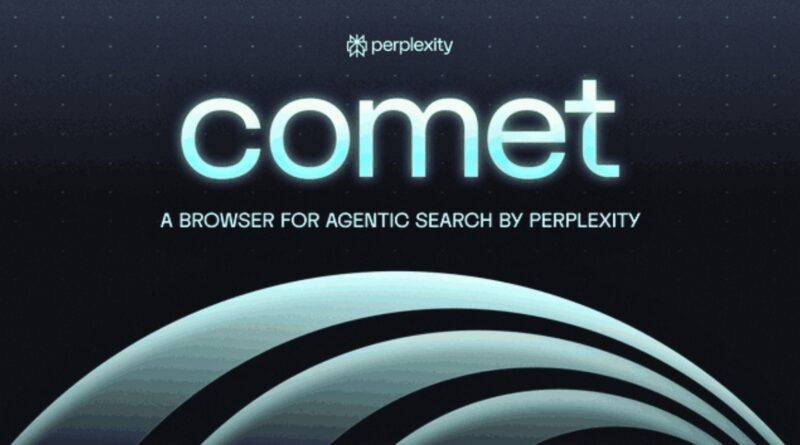Stunning Comet: Know All About Perplexity’s New AI Browser
By WFY Bureau Desk | Science & Technology | June 2025 Edition
The Browser Revolution We Didn’t Know We Needed
In a world increasingly shaped by generative artificial intelligence, even our most basic digital tools are undergoing transformation. The humble web browser, long considered a passive gateway to information, is now poised for its most significant evolution in decades. At the forefront of this shift stands Comet—a new AI-powered browser developed by Perplexity, a company already distinguished for its conversational and citation-rich search technology.
While Chrome, Safari, and Edge continue to dominate through speed, design, and cloud integration, Comet steps into an entirely different arena. It isn’t just about accessing the internet—it’s about understanding it. Comet promises not just better search results, but a smarter and more interactive browsing experience built for the demands of an AI-first future.
What Makes Comet Unique?
1. Built on an Answer-First Philosophy
At its foundation, Comet leverages the same engine that powers Perplexity’s acclaimed search interface—known for direct answers backed by transparent citations. But unlike conventional browsers that serve as mere launchpads for search engines, Comet integrates this intelligent layer directly into the browsing journey.
It doesn’t just passively open web pages; it actively assists the user in understanding them. Highlight a complicated passage, and Comet will break it down, simplify it, and cite trustworthy sources—all in real time. This makes the browser an intellectual partner rather than a passive portal.
2. From Search Bar to Study Assistant
Comet incorporates AI into the core browsing workflow. Instead of toggling between tabs to look up definitions, verify statistics, or cross-reference terms, users can engage the browser itself in a contextual conversation.
Features include:
- On-the-fly summaries of long-form content, blogs, or white papers
- Real-time query threading, where users can conduct multi-step research and retain a timeline of their searches, AI responses, and citations
- Citation transparency, where every AI-generated insight includes a link to the original source
This builds trust and ensures users maintain intellectual control of their research while accelerating comprehension and productivity.
The Case for AI-Native Browsing
The standard browser experience, while powerful, is still largely manual. Even with AI assistants like Microsoft Copilot or Google’s Gemini integrations, users are typically required to install extensions or navigate sidebars. In contrast, Comet is designed natively with AI in its DNA.
This matters because the internet has evolved. It’s no longer a static depository of content but a fluid, fast-changing information ecosystem. Traditional methods of finding, filtering, and engaging with this content are no longer efficient—especially in academic, professional, or even casual research contexts.
A 2023 survey by Statista revealed that over 60% of users aged 18–35 found the traditional search-and-scan browsing method inefficient when engaging with complex topics such as finance, health, or climate science. Meanwhile, an Adobe Digital Trends Report noted a 53% increase in demand for content summarisation tools, particularly among students and knowledge workers.
Trust in the Age of Misinformation
In a time when misinformation and AI-generated disinformation campaigns are proliferating, Comet’s emphasis on transparency and citation is both timely and essential. The browser’s AI engine draws information from verifiable sources and always provides a direct link to those references.
This approach resonates strongly with digital citizens weary of content that is algorithmically optimised but factually unreliable. In fact, a 2024 Pew Research Centre study found that 72% of users surveyed in India and the United States believe search engines should do more to highlight verifiable, sourced content over opinion or unverified material.
By embedding source accountability directly into the browser experience, Comet aligns with this growing public demand for trust, traceability, and digital clarity.
Designed for Curiosity and Critical Thinking
One of Comet’s most promising features is the ability to start “threads”—interactive, AI-assisted research journeys that track your questions and build a structured response map over time. Think of them as dynamic research notebooks: a mix of search history, AI explanations, citations, and user insights all bundled into one clean interface.
This encourages:
- Deeper learning over surface-level skimming
- Critical thinking through the exploration of multiple perspectives
- Knowledge curation, where users build and retain thematic threads for future reference
The user interface is clean, minimalistic, and distraction-free—designed not to flood your screen with banners, pop-ups, or irrelevant results.
Limitations and Considerations
As promising as Comet is, it isn’t yet a full replacement for all browsers—especially for users who rely on complex extensions, developer tools, or advanced tab management. Nor is it fully geared for enterprise-level workflows, though that may evolve over time.
Additionally, Comet is still in its early-access phase, and as with any new browser architecture, stability, performance optimisation, and third-party compatibility are areas that will need attention as it scales.
However, for students, educators, knowledge workers, and curious minds who prize understanding over mere access, Comet offers a compelling new paradigm.
The Indian Context: Why Comet Matters Now
India’s internet user base is projected to reach over 900 million by the end of 2025, according to the Internet and Mobile Association of India (IAMAI). This makes India the second-largest digital consumer market in the world. But with increased access comes new challenges: information overload, content pollution, and widespread digital fatigue.
A study by KPMG and Google found that 90% of new Indian internet users prefer content in their native language, and 75% struggle to evaluate the authenticity of online information. For these users, a browser like Comet—capable of explaining content in accessible terms and showing its sources—could be transformative.
Moreover, as India pushes forward with its National Education Policy (NEP 2020), which emphasises digital learning and critical thinking, tools like Comet can supplement formal education with intelligent, real-time research capability.
Global Diaspora Relevance
For members of the Indian diaspora, particularly students and professionals scattered across the UK, the US, Canada, Australia, and the Middle East, Comet could be a vital aid in managing their academic and work lives. Whether researching legal policy, medical literature, investment opportunities, or cultural material, a browser that “thinks with you” instead of “throwing links at you” is invaluable.
Diaspora professionals often straddle multiple knowledge systems—balancing Indian context with global standards. Comet’s AI-driven, source-backed approach can help them navigate this dual identity more fluently.
What’s Next for Comet?
Perplexity’s ambition seems clear: to craft not just a smarter browser, but a better internet experience—one that empowers users to think, learn, and engage more meaningfully. As AI becomes increasingly embedded in our digital interactions, the tools we use must evolve to support thoughtful usage over passive consumption.
In the coming updates, users can expect:
- Multi-language support
- Deeper personalisation through saved learning paths
- More robust privacy and control over data
- Enhanced collaboration tools for shared research threads
Early testers have described Comet as “a cross between a tutor, a research assistant, and a digital conscience.” If the development stays on course, Comet may become the new gold standard in ethical, user-first AI browsing.
Conclusion: From Web Surfing to Web Understanding
The launch of Comet signals a profound shift in how we engage with the web. Rather than continue the cycle of search → click → scan → repeat, Comet offers a route to search → understand → apply. It is less a tool and more a co-pilot—quietly steering you toward knowledge, not just content.
In an age dominated by clicks and algorithms, Comet invites us to slow down and think. And perhaps that’s the most radical thing a browser can do.
Disclaimer:
This article is based on publicly available information and analysis as of June 2025. The views expressed are independent editorial insights intended for informational purposes under The WFY’s journalistic mandate. No commercial relationship exists between WFY and Perplexity.ai at the time of publication. Readers are advised to review official sources and privacy policies before adopting any new technology.




